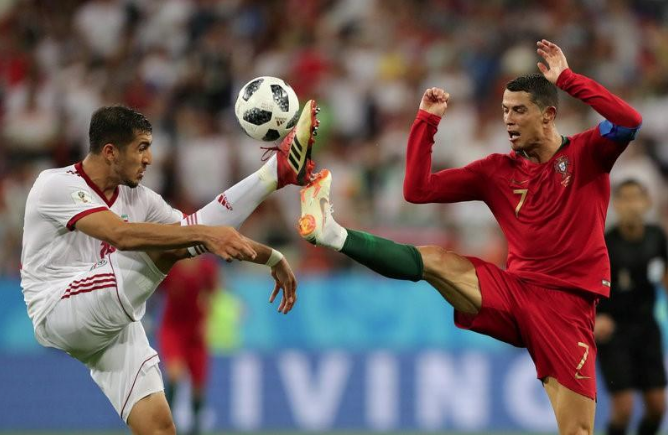Iran's footballers were heartbroken last night – but the game's changing for the nation's women
Even as Iran's World Cup dreams were dashed, Iranian women fans were reinvigorated.
The Iranian football team, known as Team Melli, has now played all three of its group stage games at the 2018 World Cup in Russia. But dreams of success were squashed by a dramatic draw against Portugal, leaving them with too few points to continue to the knock-out stages next week.
While there was no victory for the team, there was a victory for the women of Iran, particularly those who are football fans. Games were screened and sanctions lifted so that Iranian women could witness the nail-biter for themselves last night.

For the first time since 1979, female football fans were allowed to enter an Iranian football stadium to watch live broadcasts of the World Cup. The ban was lifted on June 20 for the second group stage match against Spain and again last night for the deciding match against Portugal.
The Azadi stadium in Tehran last hosted women in 1979 and the last world cup attended by women was in 1978. Women have since attempted to enter the stadium, disguised in beards and hats, but to little avail. In March of this year 35 women attempted to enter the stadium to watch the game between Tehran teams Esteqlal and Persepolis. They were removed from the stadium by the authorities.
The rule that bans women from watching male sports is enforced as a religious restriction. President Ahmadinejad, after taking office in 2005, passed a law allowing women to attend Iran's soccer matches, but he was overruled by the country's religious authorities. Current president Hassan Rouhani has made similar promises. Religious officials, however, have condemned the move towards this leniency, which they believe prevents women from being subject to 'cursing and bad behaviour' from male fans. The general prosecutor Mohammad Jafar Montazeri criticised its suspension, saying he was 'ashamed' of the actions of some women who had 'removed their head scarves and started to sing and dance'.
It was a close call as to whether this would happen at all. The ban had not been lifted in time for the first game against Morocco and many women were turned away from the game against Spain, with police citing 'infrastructure problems' as the reason behind the eviction. It was said that families staged a sit-in at the stadium until women, who had purchased tickets, were given entry to the stadium.
This is not the first time, however, that Iran has been controversial in its choices surrounding World Cup tournaments. In 2014, in the match against Belarus, Andranik Teymourian was chosen to captain the national team – its first Christian captain. Since then, Teymourian has been lauded as a sporting hero for flying the flag both for his country and for his faith. He is not present this year.
Pressure has been put on FIFA to tackle Iranian authorities with regards to the strict rules surrounding the screening of international games. Many have taken to the streets in Russia and outside the stadiums to express this. One sign read, '4277km to attend the stadium as a family', and other, 'Let Iranian women enter their stadiums'. FIFA president Gianni Infantino has since spoken out about conversations with Iranian leader, Rouhani, and encourages fans that the ban will be lifted 'soon'.
Soccer holds a unique place in Iranian sporting history. The current men's world cup team has been dubbed one of the best Iranian teams in recent history. The Iranian women's football team has recently qualified for the Asian Football Confederation's Women's Asian Cup with a 12-0 win against Syria. However, success does not continue off the pitch. It is hoped that the international approval that Iran has obtained from allowing women into the Azadi stadium will encourage more involvement of women on the international scene.
Translated from Farsi, Azadi means 'freedom' or 'liberty'. While there was not victory on the pitch, the beginning of liberty in the stands is a victory in itself.
Nina Mattiello Azadeh studied music and philosophy and was a Faith in Politics media intern in 2016. She has a keen interest in interfaith relations, social action and is a classical ballet dancer. Follow her on Twitter @Ninamataz











